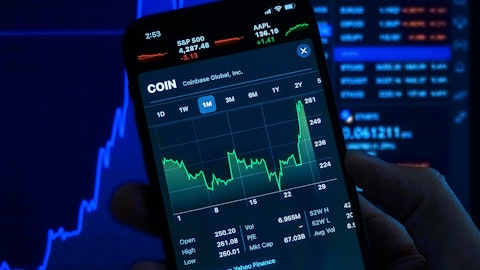But again, on a really positive note, I would say we do think that once the market starts to open back up, there’s going to be a little bit of a rebound effect, right. Because there’s been almost – there will have been almost two years of very slow transaction volume, well below, kind of call it market norms. And that will be a lot of pent-up demand for regular way selling for people who are just at a point where they need to realize their assets and they have a good basis and they can make maybe not as much profit as they would have at peak, but a nice profit. And we’ll start to see some of those challenged assets flow through the system, either through short sales or through lenders taking things back. And we are – the great thing about Bridge is we are in active dialogue, have great relationships across all of the owners and sellers, as well as this broad base of lenders that we have deep and long relationships with.
So we’re in the middle of all of it, and I think we’re going to see benefit to that. The question really becomes that happen next quarter, then following quarter, later this year, beginning of next, that’s what we don’t know, but we know it’s coming and we’re excited for it.
Adam Beatty: Got it. Thank you. That’s a clear picture of an unclear situation. Really appreciate it. Thank you.
Jonathan Slager: Right. Thank you.
Operator: Thank you. Our next question comes from Bill Katz with TD Cowen. Please proceed with your question.
Bill Katz: Okay. Thank you very much and good morning, everybody. So a couple of nested questions. So I apologize in advance. Just sort of thinking through some of your balance sheet exposure here and maybe a two-part question. The first question is, can you sort of review what your sort of max exposure is in terms of on the asset side? And then I think within that, you’d mentioned that there’s some GP equity at risk here as well. Would that influence any kind of pressure to adjust your FRE related compensation?
Robert Morse: Bill, I’m sorry, maybe I don’t understand the first part of the question. As it relates to…
Bill Katz: Sure. Sorry I interrupt you, Bob, so the – and thanks for the clarification. So you mentioned a couple of loans that are on your balance sheet that may not be fully recoverable. So I’m looking through your balance sheet and just trying to understand what kind of risk there might be in terms of a write-off related to that? And then secondarily, I think you mentioned that there’s some GP equity within the fund as well. I’m just sort of wondering to the extent that there needs to be any kind of adjustment to compensation to offset the lost earnings associated with that.
Robert Morse: I can answer the second part of the question, and Katie, you might want to touch on the first part of the question.
Katie Elsnab: Sure. And for your reference, Bill, there’s two loans outstanding to our office funds. Office fund one has a $15 million loan outstanding, and that’s really the loan that we’re monitoring for impairment. And we’ll continue to provide an update on. The second loan is office fund two, which has a $13 million loan. And based upon the performance right now, there are no indicators of potential future impairment. As it relates to Bridge’s balance sheet GP investments, we do have a $15 million GP commitment into fund two for the office strategy.
Robert Morse: And Bill, we have significant GP contributions, both from existing employee, owners into our funds, as well as selected GP contributions from Bridge into our funds as well. The typical fund terms call for a minimum of x million dollars per fund. Generally speaking, we exceed that minimum. And often those GP commitments come from individual investor, employees who were enthusiastic about the fund. Those in the aggregate, across all of our funds, past and present, those aggregate to the 100, literally to the hundreds of millions of dollars. So there’s a very significant alignment between us as managers of investment vehicles and our LPs, and that’s something that we think is valuable. We think it’s something that’s expected, and it’s something that sharpens focus in a lot of respects.
As it relates to compensation and adjusting compensation either related to any issues, including the issues around office one. Compensation is a product of a lot of different factors. It’s product of firm performance, it’s product of individual performance. It’s a product of the performance of the vertical that and we have a – what we think is a very informed and sophisticated process that allows us to appropriately compensate our employees and our colleagues. And that compensation has a number of different elements to it, as you would expect. And there’s been a lot of dialogue across alternative asset investment managers about what the right structure of compensation is. It’s kind of interesting from our perspective as we see that dialogue, because I think we’ve been early adopters of the thought that employees should benefit when our LPs and shareholders benefit, and that alignment should be pretty significant.
So this particular incident, I don’t believe will impact our compensation philosophy. It’s way too early in 2024 to have any meaningful thoughts about where compensation will be in 2024. We run a very tight ship in terms of how many people we employ, how we structure our funds, management, infrastructure and investment teams in order to deliver really good results with an appropriate cost burden related to that. We think that we’re amongst the leanest in the industry as it relates to that. And so we can deliver a really good waterfall of gross to net over the course of what we do.
Bill Katz: Great. Thank you.
Robert Morse: Hey, Bill, were you concerned about – Bill, were you – I’m just wanting to clarify whether we really answered the question you were after. I mean, you concerned about the impact of FRE going forward? Is that kind of what you were driving at?
Bill Katz: Right. I was just wondering if there’s going to be a need to make up if you had to write against, but it’s fun too. So maybe I’m making more than it needs to be. I think I’m good on that question. My second question is, just in terms of your balance sheet, can you remind me of what the debt covenants are around the debt? And then relatedly, I guess, are you adjusting your dividend payout ratio? I know there’s a lot of noise this particular quarter, but it looks like a much lower payout just on normalized earnings. So how do we think about the payout rate and then just remind me of what the debt covenants are on your own debt.
Robert Morse: Katie?
Katie Elsnab: Happy to take this one. So I think for your reference, the primary covet that you would be focused on would be, as defined in the terms of the agreement, a 3.75 leverage ratio. At this point in time, we’re approximately a three times ratio so we are very much in compliance. And then if you – I apologize, what was the second part of the question?
Bill Katz: Yes. I’m sorry for the nested set of questions this morning. Just in terms of the dividend payout policy, it looks like it moved around a little bit this quarter. I’m [indiscernible] more capital. How do you think about that payout ratio in light of just sort of the depressed earnings, the conversation this morning, and the need to reinvest back in parts of the business? Thank you.
Katie Elsnab: Sure. If you think about once, we actually our distribution this quarter was really based upon the cash. And so it did include the adjustments for the one-time charges. And so ultimately it was about a 70% payout ratio, which, obviously, our dividend is subject to our Board approval. But in the near term, I think that it’s reasonable to expect a similar type ratio.
Jonathan Slager: Right. So we are adjusting – we’re still trying to distribute reasonable amounts, but we’re trying to moderate that so that we have additional strength on the balance sheet. So that’s really the goal.
Bill Katz: Thank you.
Operator: Thank you. There are no further questions at this time. This concludes today’s teleconference. You may disconnect your lines at this time. Thank you for your participation.
Follow Bridge Investment Group Holdings Inc. (NYSE:BRDG)
Follow Bridge Investment Group Holdings Inc. (NYSE:BRDG)
Receive real-time insider trading and news alerts



